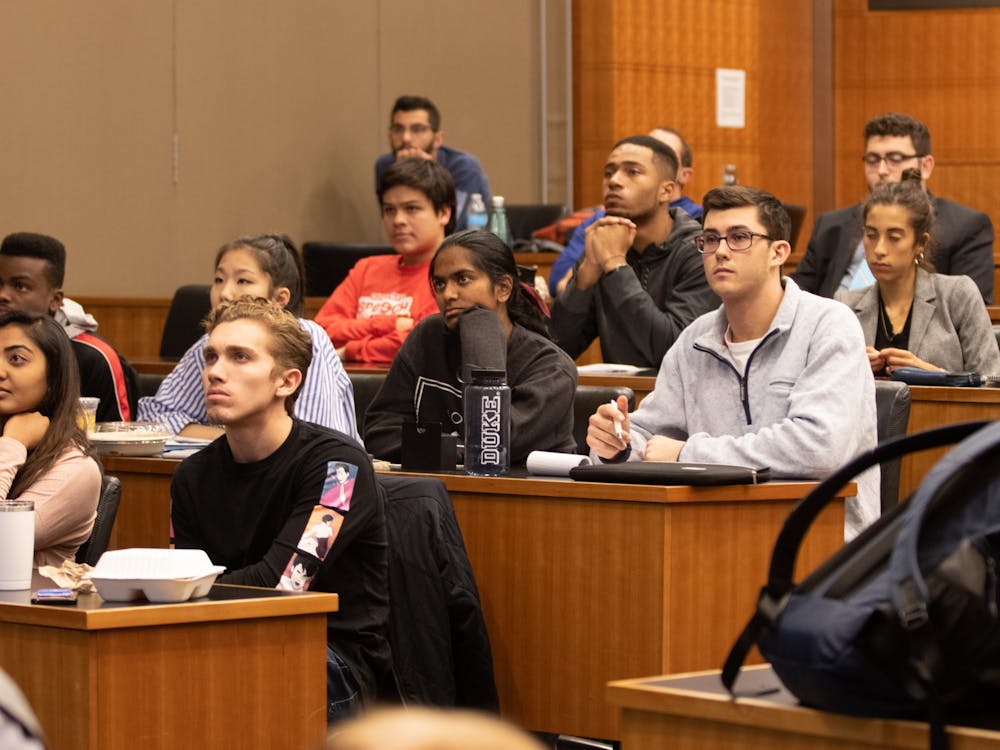Senators saw the first reading of potential by-law amendments at Wednesday’s DSG Senate meeting.
If approved, the change will require DSG Judiciary hearing procedures to be publicly available. The changes also rearrange the by-laws to clarify various sources of confusion from last semester, such as the application process for new justices, which can now be found in a different section.
Junior Jannis Stoeter, chair of the Senate Judiciary Committee, emphasized the need for the amendment to section 7.
“Because hearing procedures are set by the Judiciary, they aren’t necessarily transparent,” he told the Senate. “It’s important for us to draft legislation on hearing procedures that the Judiciary, in essence, has to follow.”
Senator Matthew Ralph, a sophomore, led the readings of amendments to the election and executive by-laws.
The proposed changes also prevent DSG attorneys, including the attorney general, from endorsing candidates or serving on their campaigns. Attorneys general were already barred from running for elected office.
Following a complaint about allegedly priming language used in an email by Attorney General John Markis, a sophomore, during the Young Trustee election, the changes also restrict the powers of the position.
“All information distributed by the Attorney General regarding elections must not pertain to any one candidate, campaign, or specific issue(s),” the updated by-law reads. “The information distributed should pertain to voting and descriptions of roles up for election.”
The by-law also states that the attorney general should also encourage voting “without specifically endorsing any candidate or advocate for a particular issue.”
Section 9 will grant candidates two options for financing campaigns, with the option to either obtain a purchasing card from the treasurer or receive reimbursements for “properly documented expenditures.”
The executive by-law amendments would reiterate the electoral by-law changes, specifying that the attorney general cannot coordinate elections in which they serve in a candidate’s campaign and requiring that they consult the Board of Elections regarding the election process.
In other business
The Senate approved $26,533.64 in funding for various organizations. Duke Chinese Theatre received $2,195 to put on their performance of “The Insanity,” and Duke Consulting Club received $2,000 to host a Consulting Career Prep Workshop with Davis Nguyen, founder of My Consulting Offer. Duke Students of the Caribbean Association was funded $2,500 for a live band at their annual Carnivale event, and DukeAFRICA received $6,238.90 for Jabulani.
Students for Justice in Palestine received $1,625 to bring activist Dalit Baum to campus, and the Statistical Science Majors Union received $4,578 to host ASA DataFest in Penn Pavilion from Apr. 3 through 7.
Pi Kappa Alpha received $2,896.74 for Buzz for Bobby, an annual event in remembrance of a brother whom they lost to cancer.
Senators also funded $4,500 for Claire Wasserman, Founder and Chief Brand Officer of Ladies Get Paid, to speak on campus Sept. 7.
Ada Gregory led a public forum about her role as an ombudsperson on campus at Wednesday’s Student Government meeting.
The ombudsperson is a confidential, neutral resource on campus from whom students can seek guidance during conflicts or in times of struggle, Gregory said. Students can report cases and bring situations of conflict to Gregory, which she does not have to legally report unless the individual poses a threat to themselves or another individual.
Gregory, also associate director of the Kenan Institute for Ethics, said she uses a “restorative justice approach” in mediating conflict, where her goal is to “position [students] so they can advocate for [themselves].”
She is also a voice for students who are afraid to speak up due to power imbalances, especially in the classroom, where she is “happy to be that messenger for people and have those hard conversations with faculty,” she said.
Get The Chronicle straight to your inbox
Sign up for our weekly newsletter. Cancel at any time.
While Gregory is eager to spread awareness about her role on campus, her fear is creating demand without the resources to meet students’ needs. She advocated for a more sustainable outreach system where “systematic issues can be followed up on more proactively.”
Editor’s Note: Markis is a senior news reporter for The Chronicle.

Leah Boyd is a Pratt senior and a social chair of The Chronicle's 118th volume. She was previously editor-in-chief for Volume 117.

